Notion has been the reigning champion for personal and professional Knowledge Management. As a productivity tool, it has achieved the cult status of SaaS startups one can only hope to achieve, right along the ranks of Arc by The Browser Company, Figma, Slack, Miro, etc.
Notion is, in fact, so popular that you cannot escape its ecosystem of Notion consultants, monetized Notion templates, and so much more. It’s created unimaginable wealth for individuals that jumped on the Notion hype-train which has only been going up.


So, why the need for a Notion alternative? There’s many reasons. And to give you a well-rounded perspective, we asked a Notion consultant, a Notion power-user creator (100k+ followers), and a common SF builder. Well, let’s see - shall we?
For one, Notion has been shipping like crazy, and it’s starting to catch up
After going through the reddit thread - Too slow to use?, I found 4 recurring reasons of why Notion is slow:
- Addition of features like projects and advanced databases make the application memory-intensive. The extensive features for managing projects add complexity, making it challenging to organize and oversee various tasks effectively.
- Some users have noticed that Notion needs a high bandwidth to work optimally.
- Nested documents create search complexity leading to unreliable results. You could go with a flat structure and categorize them all in a database but… that’ll make the database laggy.
- Too many pages/connections with 3rd party apps.
I also wanted to speak to a long-term user who loves tinkering with SaaS.
Alex Bass is a founder who does exactly that at Efficient App. He’s been a Slite user for 8 years and currently, he’s building Efficient - A place for no-BS software reviews, done by people who are obsessed with software. After websites like G2, Gartner, Capterra have become more programmatic, Efficient actually tests every single software on their Youtube channel for really in-depth software reviews. They rate Slite as the #1 Best Knowledge Base over Notion, who’s been the reigning champion for startup wikis.
“They have this templates marketplace and they have people pitching, ‘I've solved this business case, use my template and you can do everything in your business in Notion,’ but the sheer number of people that we've met that are using Notion for everything and they're like, I'm struggling to scale this to our team. And it's because, well, they don't really know what to do in it. Well, yeah, because you've essentially built a product, you're not a Product Manager and there's no reason around this.”
If you’re building a small project with 2-3 buddies, Notion will work just fine for you. If you’re using Notion to organize your life with dashboards and client management, Notion will work fine for you too. But if you’re a team of 10 planning to scale up, Notion will give out.
“But what about the Notion ecosystem? What about Notion AI?”
I hear you. Notion’s ecosystem is great.
But if you’re a company using the standard tools like Linear, Asana, Slack, Miro, Figma, etc., you’ll be fine with any other alternative. Since these apps integrate with pretty much every day-to-day tool.
And Notion AI is a bit hard to recommend to teams. Notion’s AI features work well. It can brainstorm ideas, create content, summarize docs, translate them, and generate AI answers from your company’s information.
Notion AI costs an extra $10/user/month on top of your standard subscription price. Its premium plan starts at $8 which means a total of $16/user/month for unlimited pages and AI access. It’s affordable for personal users but grows really uneconomical for large teams. If you’re a team of 100 in need of their business plan, you’ll pay an upwards of $25,000/year just on your Notion subscription.
Notion has grown hostile to B2B teams in the 2020’s. It started as a B2B solution, initially. When it went viral for its B2C use cases, Notion tried to build for everyone. Which explains some of the decisions and unfriendly pricing for big companies now.
A lot of them have shifted to Notion alternatives. And many of them prefer Slite. As a Notion user and now Slite fan/employee, I’ll do a 1-on-1 detailed comparison of Notion and Slite.
Look
Notion and Slite both offer a minimalist, clean look at first glance, but there are some key differences when it comes to customization and overall feel.
Notion allows for extensive customization, with a wide variety of templates, cover images, icons, and even the ability to set custom colors and fonts. This flexibility lets you create a workspace that feels uniquely yours, reflecting your personal style or brand identity.

On the other hand, Slite prioritizes a more streamlined, consistent aesthetic across the platform. While you can still customize certain elements like cover images and icons, the overall design remains clean and minimal. This creates a fresh, modern feel that's easy on the eyes and helps you focus on your content without distractions.
For example, take a look at this screenshot from Slite:

The interface is sleek and uncluttered, with plenty of white space and a clear hierarchy of information. The use of subtle colors and simple icons adds visual interest without overwhelming the user.
To keep it uncluttered, Slite also gives the option to auto-hide inactive docs from your sidebar. This promises an uncluttered sidebar that’s actually usable.
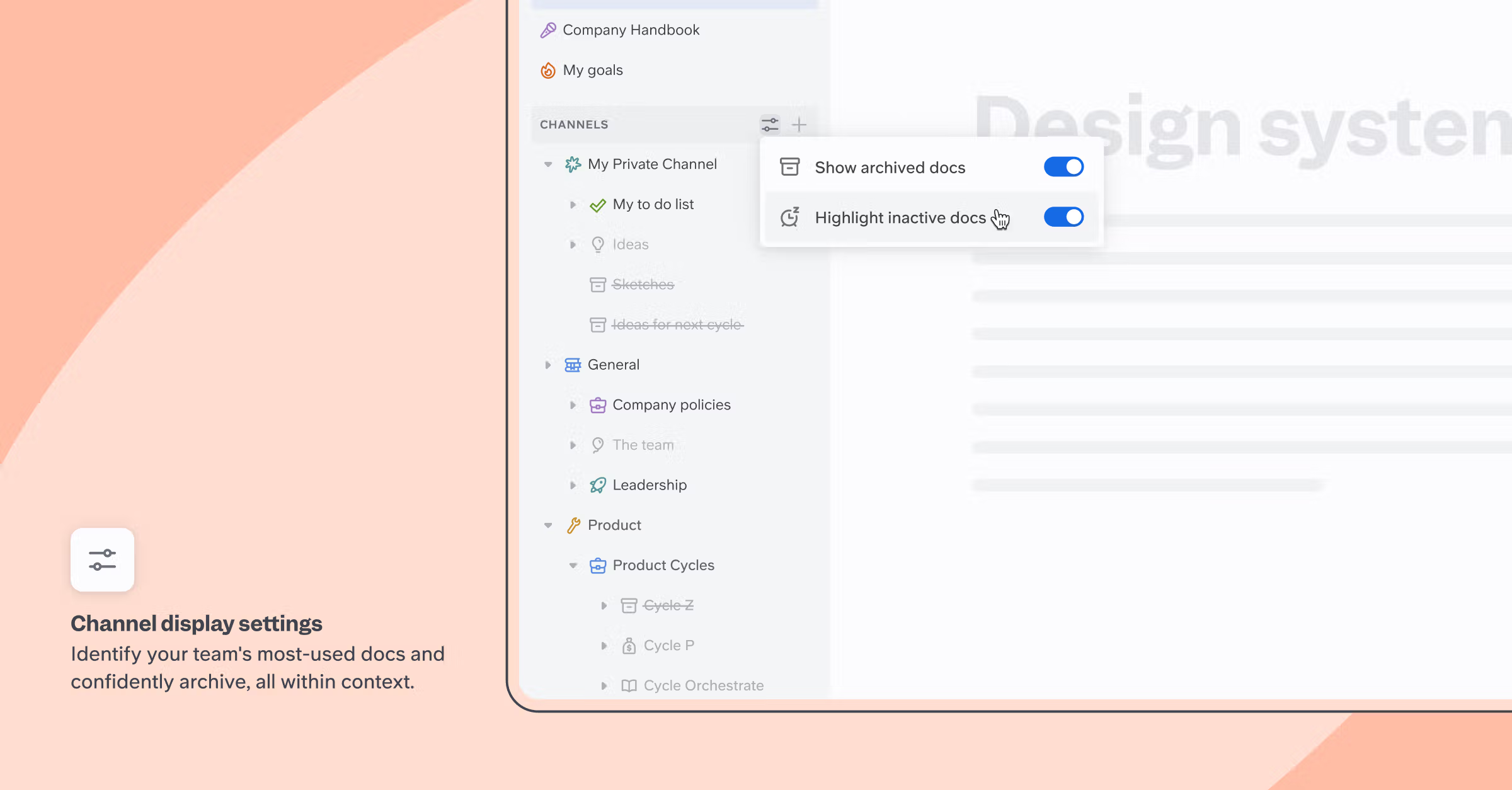
So, if you're someone who appreciates a polished, cohesive look and wants to dive right into your work without spending too much time on customization, Slite could be the perfect fit. Its fresh, minimal design helps you stay organized and focused, while still looking great.
Learning Curve
Both Slite and Notion offer a fast learning curve, thanks to their intuitive WYSIWYG (What You See Is What You Get) editors. This means you can start creating and formatting content right away, without the need for extensive training or technical know-how.
However, if document verification is a key part of your workflow, Slite has the edge. With Slite, you can verify any individual document, regardless of its location within your workspace.
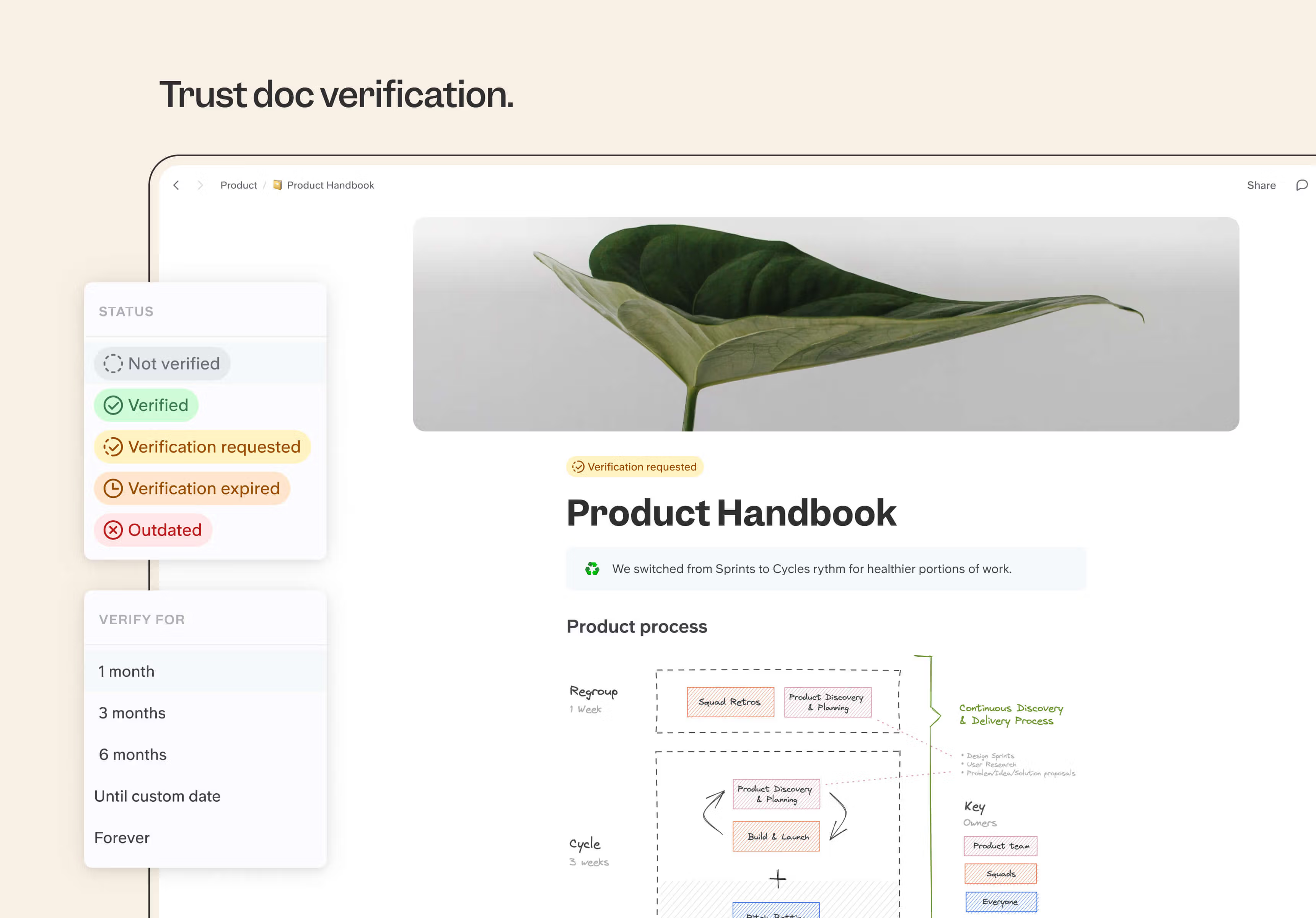
In contrast, Notion only allows document verification if the document is part of a Notion wiki. This can be a significant advantage for teams that need to ensure the accuracy and validity of their content.
Moreover, if you’re planning to share verified information with frontline workers or other team members, Slite’s dedicated knowledge management panel makes the process much simpler.
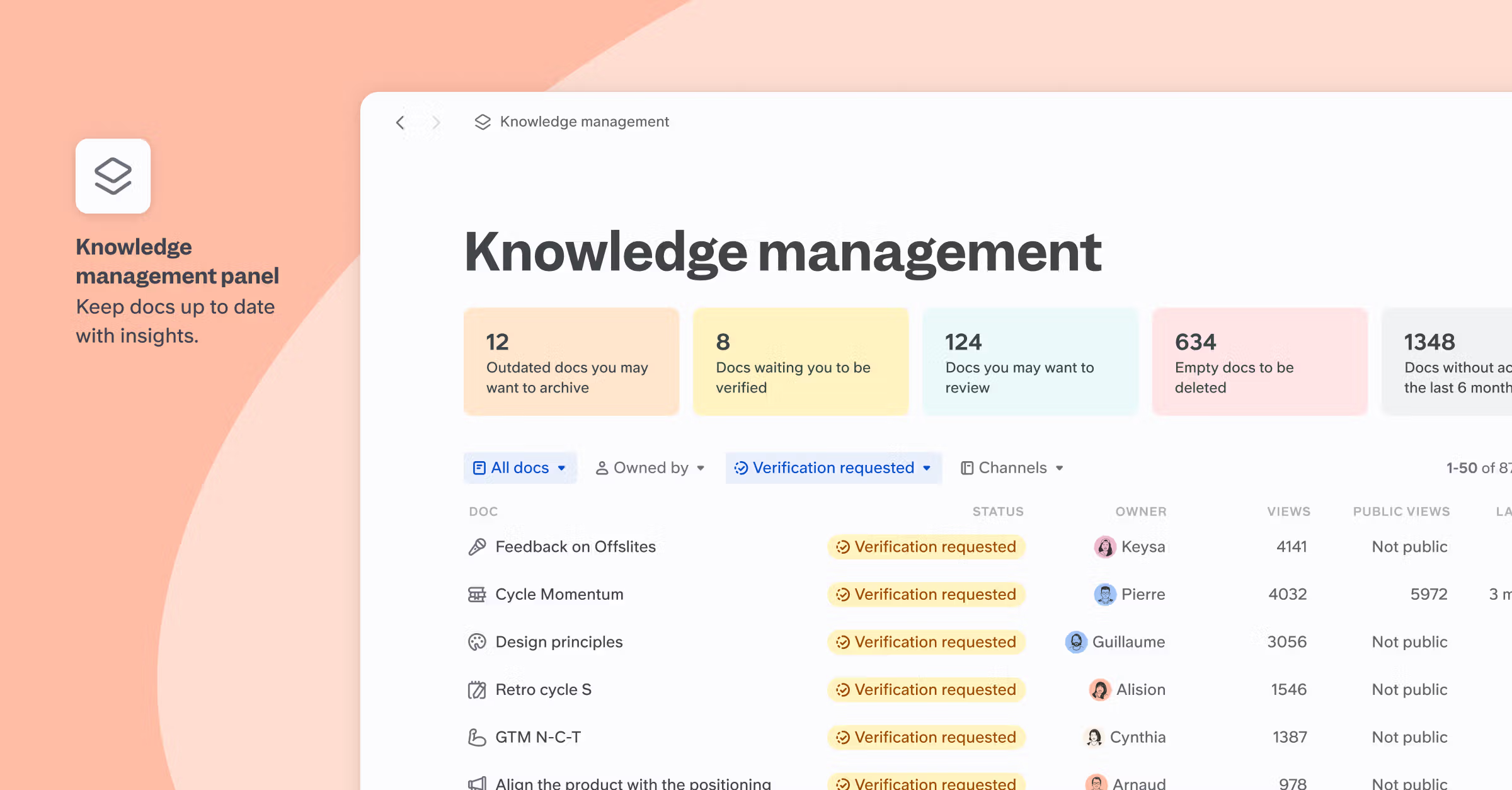
This feature allows you to organize, categorize, and share verified documents effortlessly, ensuring that everyone has access to the most up-to-date and reliable information.
One of Slite’s standout features is the ability to create recurring sub-documents based on templates.
You can choose from Slite’s template library or create your own, you can set up a database of meeting documents that automatically generate at a specified time before each meeting. This not only saves time but also ensures that all participants are reminded to contribute to the agenda beforehand.
For example, let’s say you have a weekly team meeting every Monday at 10 AM. With Slite, you can create a template for your meeting notes, including sections for agenda items, action points, and decisions made. Then, you can set up a recurring sub-document that automatically creates a new meeting document based on this template, say, every Friday at 3 PM. Slite will notify all meeting participants, reminding them to add their discussion points before the meeting begins.
Tech-savvy users may find the learning curve of both tools to be more manageable, especially when dealing with advanced features.
Editing experience
When it comes to the editing experience, both Slite and Notion offer user-friendly WYSIWYG editors that allow you to create and format content easily.
However, there’s one significant difference: Slite has native AI capabilities built directly into its editor, while Notion requires a paid add-on called Notion AI to access similar features.
If you’re working with complex databases and tables, Notion shines. Its editor allows you to create and manage intricate data structures seamlessly. Additionally, Notion’s drag-and-drop functionality enables you to arrange text blocks in parallel, creating a two-column layout effortlessly.
On the other hand, Slite excels in collaborative writing, as its editor is specifically designed with teamwork in mind. Slite’s AI-powered features are geared towards helping you create business documentation faster and more efficiently.
One standout feature in Slite is the ‘Improve with AI’ function.
This handy tool takes your rough notes, thoughts, and paragraphs and transforms them into a well-structured, readable, and skimmable document with just one click, providing instant answers to your formatting and structuring needs. This is particularly useful when you need to quickly dump your ideas into a doc and then convert it into a polished, well-formatted plan that your team can easily digest.
For example, let’s say you’ve just finished a brainstorming session and have a bunch of scattered notes and ideas. With Slite, you can simply paste your raw content into the editor and then click ‘Improve with AI.’ Slite’s AI will analyze your text, break it down into logical sections, add headings and subheadings, and even improve the overall formatting. The result is a professional-looking document that’s ready to share with your team, offering instant answers to how your scattered thoughts can be best organized.
But Slite’s AI capabilities don’t stop there. You can also change the tone or language of your entire document with a single click.
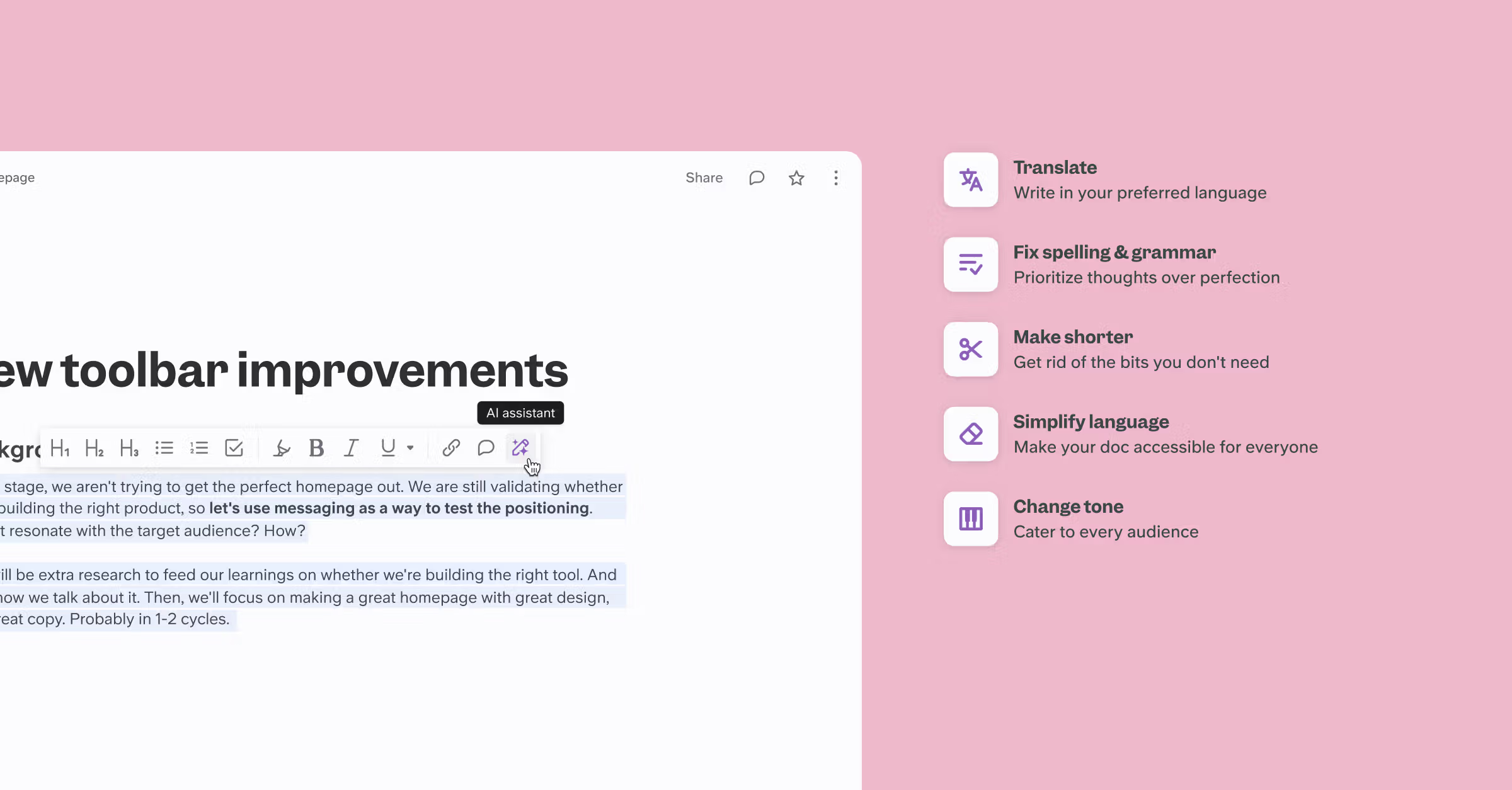
Whether you need to switch from a casual to a more formal tone, or translate your content into another language, Slite makes it a breeze. This is especially handy when you’re collaborating with team members from different departments or regions, as you can easily adapt your writing style to suit your audience.
The only big difference between their AI capabilities is this - Notion’s AI features natively help you create content, Slite’s features don’t. Slite intentionally wants users to focus on using AI as a copilot for presenting their thoughts better. AI content creation, especially in a Knowledge Base, runs the risk of populating your Knowledge Base with regurgitated, lower-quality information with time.
Integrations
Slite and Notion offer integrations to enhance workflow and connect with other tools.
Slite offers two browser extensions:
- Draft by Slite: This addon allows you to open a new Slite document in a new browser tab, making it convenient to take notes or start working on a project without navigating away from your current page.
- Ask: This addon turns your Slite workspace into a private company chatbot. With Ask, you can search your Slite knowledge base directly from your browser. Type in your question, and Ask will scan your Slite docs to provide relevant answers.
Slite also integrates with automation platforms, project and task management tools, and collaboration software. These integrations allow you to streamline processes, sync data between apps, and keep everyone on the same page.
Notion gives you a wide variety with an extensive ecosystem of native and third-party integrations/widgets. If you can think of a use case, there’s probably an existing Notion integration/extension for it.
For example, if you’re a team that primarily uses tools like Google Drive, Slack, and Asana, Slite’s integrations will likely cover your needs. You can sync your Slite docs with Google Drive, share updates via Slack, and manage tasks in Asana without leaving your Slite workspace.
In contrast, if you enjoy experimenting with various apps and creating workflows, Notion’s third-party support will be much more appealing.
If you value simplicity and want a focused set of integrations that work with your existing tools, Slite is a good choice.
But if you thrive on flexibility and enjoy exploring new apps and widgets, Notion will be perfect for you.
Search
When it comes to finding information quickly, both Slite and Notion offer powerful search capabilities. However, Slite's AI-powered search, called Ask, takes it a step further by allowing you to connect and index data from external sources.
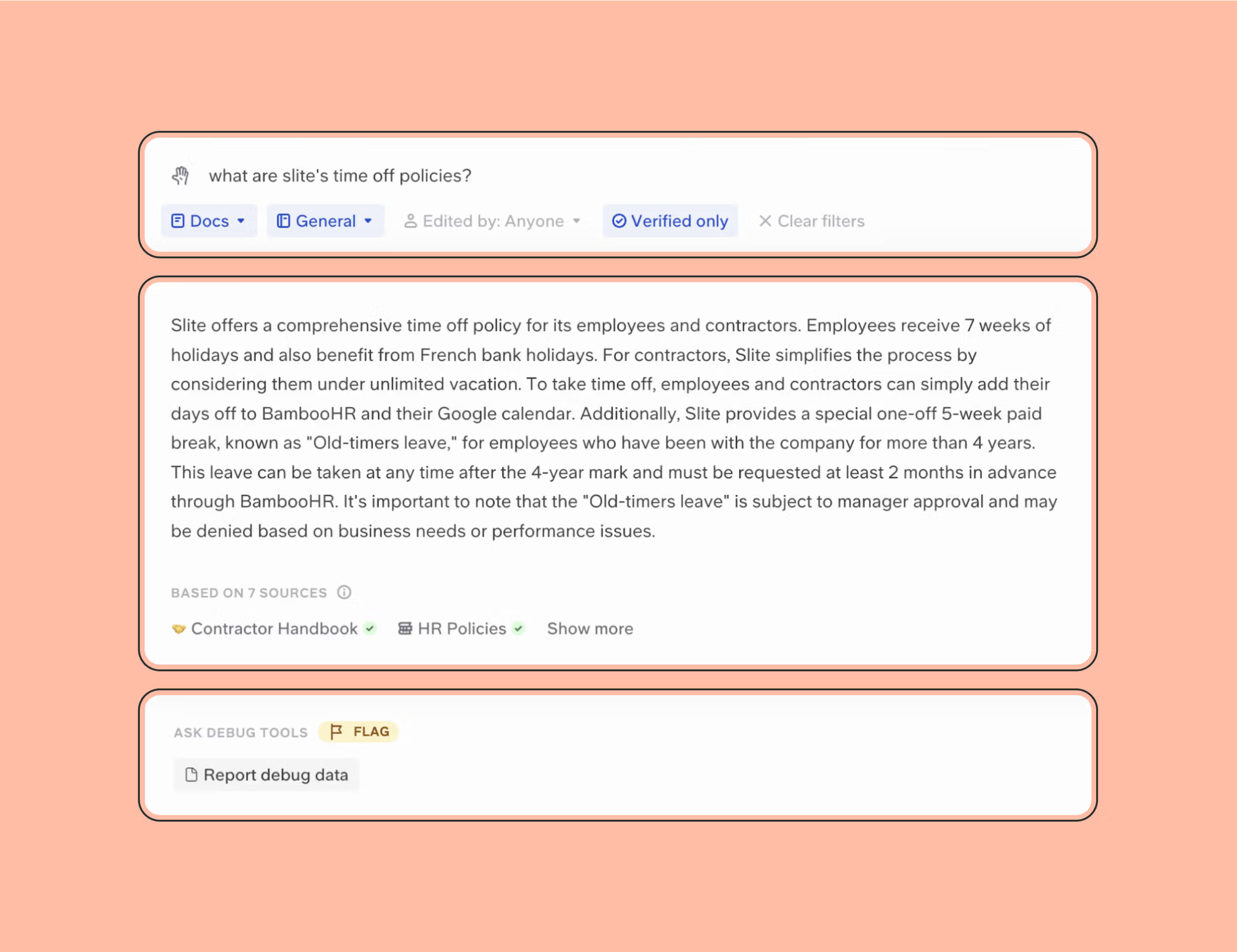
Slite's Ask is natively built into the platform and leverages AI to provide more accurate and relevant search results. When you type a query into Ask, it not only searches through your Slite workspace but also scans connected external sources like Google Drive and Slack. This means you can find the information you need, even if it's not directly stored in Slite.
For example, let's say you're looking for a specific conversation that happened in Slack a few weeks ago. With Ask, you can simply type in a few keywords related to that conversation, and it will surface the relevant Slack messages along with any related documents in Slite or other connected sources. This saves you the time and effort of manually searching through multiple platforms.
It’s one of the key points that Efficient also outlines in their Slite Review:
“While Notion went the direction of "now you can generate content using AI!", Slite was more of the mindset of "hold on, the actual problem is that we, as a shared team, already have so much information. Some outdated and require updating, some entirely outdated and should be ignored. What if we could help you sort through all of this information to help your team find the actual answers they are looking for?”
Notion's search, while also robust, is limited to the data within your Notion workspace. It doesn't have the ability to connect and index external sources like Slite's Ask. However, if your team primarily relies on Notion for documentation and doesn't heavily use other tools, Notion's search will still be sufficient for your needs.
The biggest thing to note with Notion search - ensure you don’t use nested docs too much. Or have multiple integrations across pages because it tends to make Notion slow, especially for teams.
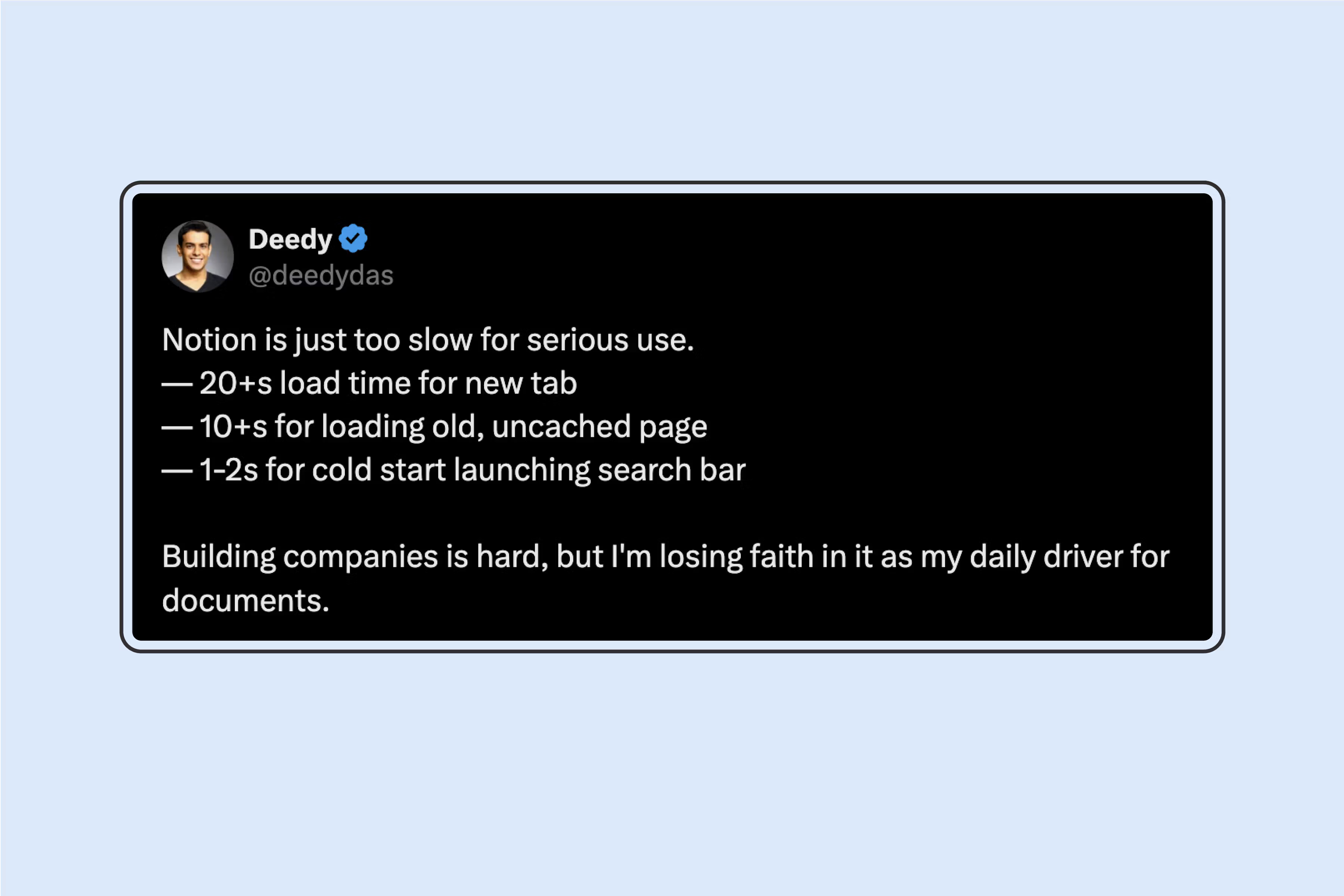
The real advantage of Slite's Ask shows when teams heavily use multiple tools for communication and collaboration.
If your team frequently communicates via Slack, shares files on Google Drive, and collaborates on designs in Figma, having a search tool that can index and surface information from all these sources is a game-changer.
With Ask, you no longer have to waste time jumping between different apps to find the information you need. You can simply search in one place and trust that Ask will provide the most relevant results from across your connected tools.
On the other hand, if your team is fully async and relies primarily on documentation within your knowledge management tool, both Slite and Notion's search capabilities will serve you well.
In this case, your decision comes down to other factors like ease of use, pricing, team adoption, etc.
While Slite's Ask provides powerful search within connected sources, our team recognized an even broader challenge: organizations need to search across their entire tool ecosystem, not just what's connected to their knowledge base. This insight led us to build Super.work, an AI-powered enterprise search platform that connects all your company tools - Slack, Linear, GitHub, Google Drive, Confluence, and 20+ others - into one intelligent interface.
Super represents the evolution of workplace search, where teams can ask natural language questions like "What's our mobile app deployment process?" and get comprehensive answers with source citations from across every platform they use. This creates a complete knowledge ecosystem: Slite for structured documentation and collaboration, Super for unified search across your entire information landscape.
Together, they solve both the documentation challenge (organizing knowledge) and the discovery challenge (finding knowledge wherever it lives). While Notion tries to be everything to everyone, this focused approach ensures teams get best-in-class solutions for both creating knowledge and accessing it instantly, regardless of where it's stored.
Comprehensive Knowledge Management and Analytics
Notion and Slite stand out as all-in-one workspaces, offering comprehensive solutions for knowledge management. Notion provides limited page analytics and advanced workspace analytics, which are only available in their Enterprise plans. This means that users on lower-tier plans may not have access to the insights they need to effectively manage their knowledge base.
On the other hand, Slite offers a dedicated Knowledge Management Panel, which serves as a powerful, centralized hub for managing your company’s knowledge base.
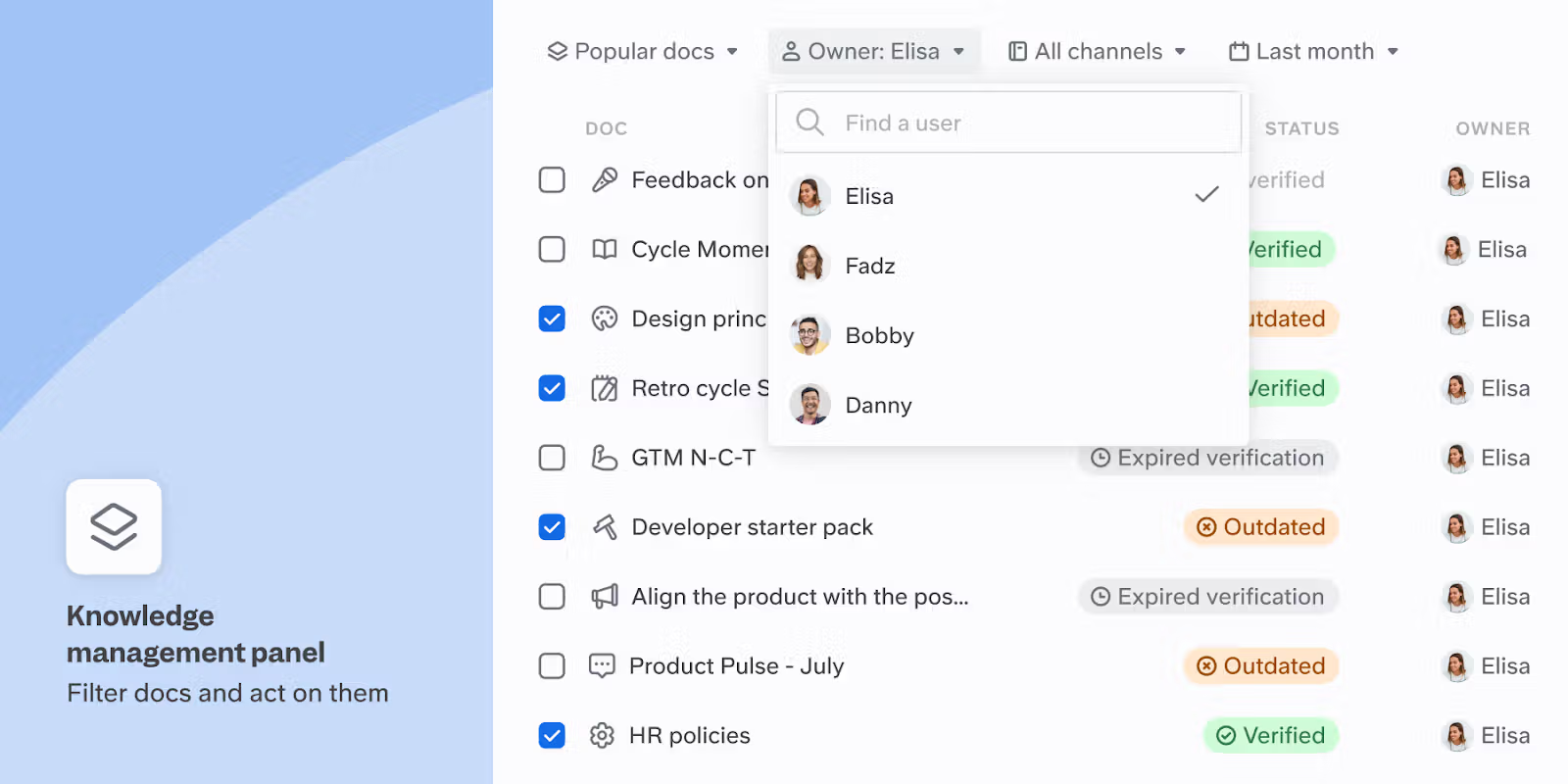
This panel allows you to slice and dice your content, showing just what you need, whether it’s HR docs filtered by department or identifying outdated documents for archiving. The panel also provides workplace insights, highlighting documents that require attention and enabling you to act on them in bulk.
One of the standout features of Slite’s Knowledge Management Panel is the smart AI-powered filter. This feature allows you to ask questions in natural language, making it even easier to keep your knowledge base fresh and relevant. By leveraging AI, Slite streamlines the process of finding and managing the information you need, saving you time and effort.
In addition to the Knowledge Management Panel, Slite offers workspace analytics in every plan, providing valuable insights into the usage and effectiveness of its advanced features. With workspace analytics, you can track document readers and writers, monitor Ask feature usage, and evaluate the percentage of searches that lead to finding the right documents. This comprehensive set of metrics empowers you to optimize your workspace’s efficiency and enhance collaborative knowledge sharing.
Slite’s workspace analytics also allow you to easily filter data by time and channel, giving you a deeper understanding of user engagement and information accessibility. Unlike Notion, which limits advanced analytics to Enterprise plans, Slite makes workspace analytics accessible to everyone in the workspace, except those with the guest role. This inclusive approach ensures that all team members can benefit from the insights provided by the analytics, fostering a more collaborative and data-driven work environment.
Team Collaboration
Slite and Notion have got you covered, but they approach it in different ways. Slite is all about knowledge management and documentation, while Notion tries to be the Swiss Army knife of productivity, handling everything from notes to project management. For a remote team looking for a streamlined solution without unnecessary features, Slite stands out as the better choice, offering simplicity and efficiency in creating a private wiki.
If you’re a team that’s already rocking a dedicated project management tool like Linear or Asana, Slite is your best bet. It’s designed specifically for managing and sharing knowledge, so you can focus on creating killer docs without getting bogged down in task management. Plus, Slite integrates seamlessly with your existing project management setup, so you can keep your workflows running smoothly.
Slite’s collaboration features are top-notch, too. You can co-edit documents in real-time, leave inline comments, mention teammates, and even chat directly within the app. It’s like having a virtual war room for your docs, without the stale coffee and flickering fluorescent lights.
On the flip side, Notion takes a more holistic approach. It’s got all the collaboration features you’d expect, like real-time editing and comments, but it also packs in project management tools like task lists, timelines, and databases. If you’re looking for a one-stop-shop for all your team’s needs, Notion might be the way to go.
However, trying to do everything in one tool can be a bit like juggling chainsaws – impressive, but not always practical. If you’ve already got a project management system that works for you, forcing your team to switch to Notion’s all-in-one approach might not be the best idea.
Pricing
Slite and Notion offer different pricing structures to cater to various team sizes and budgets.
Slite provides three pricing plans: Standard, Premium, and Enterprise. All plans include AI features, so you don’t need to pay extra. However, Slite doesn’t offer a free plan, but they provide a 2-week free trial.
- Standard: Suitable for small teams getting started with knowledge management
- Premium: Unlocks advanced features like unlimited connection to external sources, custom domain for public docs, user provisioning, and Open ID SSO.
- Enterprise: Adds the following features on the top of the premium plansome text
- Offers Read-only role
- Audit logs
- Priority support
- Dedicated account manager
- Personalized onboarding
- Service Level Agreement
Notion offers a four-tiered pricing structure: Free, Plus, Business, and Enterprise.
- Free: Designed for individuals or small teams to explore Notion’s features
- Plus: Ideal for individuals or small teams needing additional storage, 30 day page history, unlimited collaboration blocks and invites of up to 100 guests.
- Business: Tailored for larger teams requiring private spaces, advanced doc analytics, 90 day page history and SAML SSO
- Enterprise: Includes user provisioning (SCIM), advanced security & controls, audit log, customer success manager, workspace analytics, unlimited page history, security & compliance integrations.
Note that Notion’s AI features require an additional fee of $10 on top of the base plans.
When choosing between Slite and Notion, consider your team’s specific needs, size, and budget. Slite offers AI features included in all plans, while Notion provides a more flexible pricing structure with a free plan option.
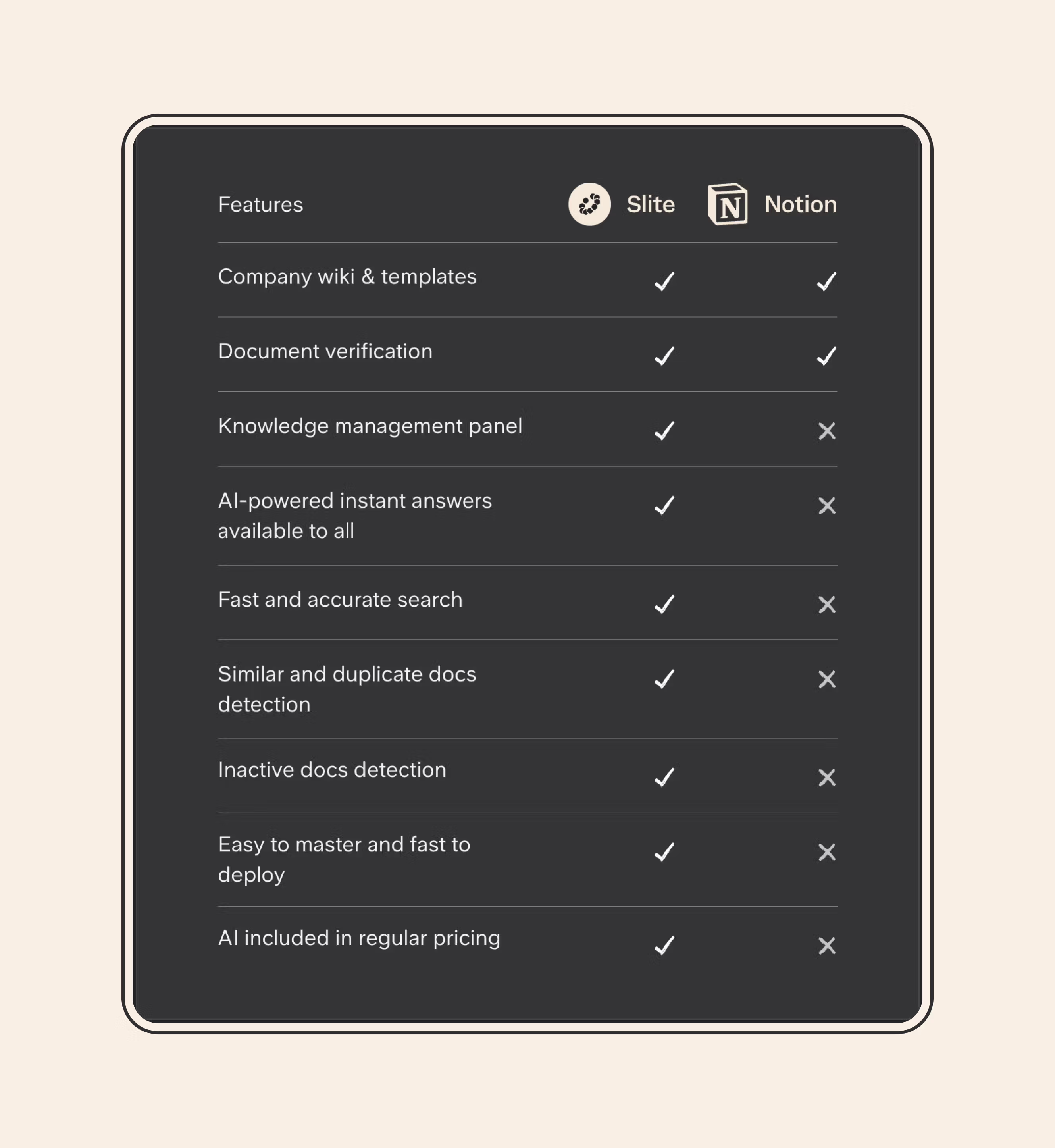
To make the best decision, evaluate your priorities and budget, and consider taking advantage of Slite’s 2-week free trial or Notion’s Free plan to test the platforms before committing. Additionally, exploring other alternatives like Nuclino can offer different pricing or features that might better suit your team's needs.
Conclusion: Notion’s perfect for individuals, Slite’s great for scaling teams.
Notion, with every update, tries to expand its ecosystem to fulfill its promise of being the Lego of Productivity Tools. But it comes with the tradeoff of scale. You can either go horizontal or go vertical.
Notion is like a drag-and-drop block-based coding/documentation environment. Because the possibilities are endless, it creates a pressure on teams to figure out the best way to use Notion for everything.
In a lot of ways, it’s exactly what Notion wanted from the beginning.
When you have Legos, it’s on you to make something beautiful out of them.
But that creative freedom slowly turns into decision overload pretty fast.
Slite has never tried to be an all-in-one. It’s an intentional Knowledge Management Solution for teams who like getting sh*t done. Slite’s future product roadmap doesn’t include adding calendars/complicated fluff, it only focuses on making Slite a better Knowledge Base for teams.
So the decision boils down to what you’re looking for. Are you looking for a software that can take everything you throw? Do you just want to build personal systems and organize your life? Notion’s flexibility will be perfect for you. Especially if you’re a bit of a builder with a couple hours to tweak things.
Or are you looking for a documentation tool for your team? If so, Slite will give you a better experience today, and even more so with time.

